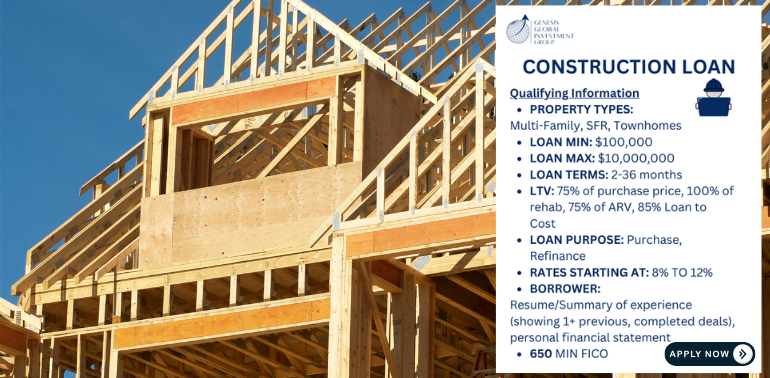Ground-Up Construction Loan (GUC)
A Ground-Up Construction Commercial Loan is a specialized financing option designed for developers and investors looking to construct a commercial property from scratch. These loans cover land acquisition (if needed), construction costs, and sometimes soft costs associated with the project.
Considerations Before Choosing Ground-Up Construction Loan:
- Loan Purpose: Funds the construction of commercial properties such as:
- Office buildings
- Retail centers
- Industrial facilities
- Multi-family apartments
- Mixed-use developments
- Hospitality projects (hotels, resorts, etc.)
- Loan Amount – Typically ranges from $10 million to $100 million+, depending on the project’s scope.
- Loan-to-Cost (LTC) Ratio – Up to 75%-85% of total project costs.
- Loan-to-Value (LTV) Ratio – Typically up to 65%-75% of the completed property value.
- Interest Rates – Typically 8%-12%+ for private lenders, with rates varying based on the borrower’s credit profile, project risk, and lender type.
- Loan Term – Usually 12 to 36 months, with possible extensions
- Repayment Structure – Usually interest-only during construction, with a balloon payment due at loan maturity.
- Exit Strategy – Borrowers must have a solid exit strategy, such as refinancing into a permanent loan or selling the completed project. Stabilizing the property with tenants may be required for refinancing.
- Disbursement Schedule – Funds are released in stages (draws) based on construction progress. Understand inspection requirements and ensure a smooth draw request process.
- Recourse vs. Non-Recourse – Loans may be recourse (personal guarantee required) or non-recourse (limited to the property itself).
- Contingency Reserves – Construction projects often face delays and cost overruns. Having at least 5%-10% of the budget in reserves can prevent financial strain.
- Project Feasibility & Planning – Conduct a market feasibility study to determine demand, pricing, and competition. Ensure detailed construction plans, timelines, and budgets are in place. Assess zoning laws and permits to avoid legal issues.
- Down Payment & Equity Contribution –Borrowers typically need to contribute 20%-30% of the total project cost. Ensure you have enough liquidity to cover upfront costs and contingencies.
Qualification Requirements:
- Experience – Developers with prior construction experience are preferred. If you lack experience, having a qualified general contractor can help secure approval.
- Financial Strength – Strong borrower financials and liquidity are crucial.
- Project Feasibility – A well-defined construction plan, timeline, and market analysis.
- Contractor & Team – A qualified general contractor and construction team.
- Dedicated Client Support
- Competitive Rates & Terms
- Tailored Financial Solutions
- Fast & Easy Application Process
- Access to a Broad Lender Network
- Financial Expertise You Can Trust

We specialize in Ground-Up Construction Loan financing across all 49 states. Our competitive rates, flexible terms, and quick approval process are designed to help you succeed. Whether you’re a seasoned investor or new to the market, we’ll work with you to structure a loan that fits your project’s unique requirements.
Contact Us Today Ready to fund your next Bridge Loan? Reach out to Genesis Global Investment Group for expert guidance and fast funding. We’re here to help you maximize your investment potential! Apply Now
Ground-Up Construction Loan FAQ's
Who can apply for a Ground-Up Construction Commercial Loan?
Developers, investors, and business owners with a well-planned construction project can apply. Lenders prefer borrowers with prior construction experience and strong financials.
What types of properties qualify for these loans?
Eligible properties include office buildings, retail centers, warehouses, industrial spaces, apartment buildings, mixed-use developments, and hotels.
How much financing can I get?
Loans typically cover 75%-85% of total project costs, with amounts ranging from $100,000 to $10 million+, depending on lender guidelines.
How is the loan amount determined?
Lenders evaluate the loan-to-cost (LTC) ratio and loan-to-value (LTV) ratio, project feasibility, borrower’s financials, and market conditions.
What is the difference between LTC and LTV?
Loan-to-Cost (LTC) – The percentage of total project costs a lender is willing to finance.
Loan-to-Value (LTV) – The percentage of the property's estimated completed value a lender is willing to finance.
What are the typical interest rates?
Interest rates range from 8% to 12%+, depending on factors like borrower experience, and project risk.
How long is the loan term?
Terms typically range from 12 to 36 months, with potential extensions if needed.
How does the loan disbursement process work?
Funds are disbursed in draws based on construction milestones. Borrowers must submit progress reports and inspections to receive the next round of funding.
Is a down payment required?
Yes. Borrowers are typically required to cover 20%-30% of total project costs.
What documents are required to apply?
- Business and personal financial statements.
- Project plans and cost breakdown.
- Construction timeline and permits.
- General contractor information.
- Market feasibility study.
- Exit strategy (sale or refinance plan)
What is the interest rate on a loan?
Bring to the table win-win survival strategies to ensure proactive domination. At the end of the day, going forward, a new normal that has evolved from generation X is on the
Can I get a loan without prior construction experience?
It’s challenging but possible. Lenders may require a strong team (experienced contractor, project manager, etc.) and higher borrower liquidity.
What happens if the project takes longer than expected?
Borrowers may request an extension, but lenders will evaluate the project's progress. Delays can lead to increased costs or refinancing needs.
What are common exit strategies for Ground-Up Construction Loans?
- Refinancing into a permanent loan (such as a commercial mortgage)
- Selling the completed property
- Leasing and stabilizing the property for long-term financing
Do these loans require collateral?
Yes, the property under construction serves as collateral. Some lenders may require additional guarantees.
Are there prepayment penalties?
Some loans have prepayment penalties or minimum interest requirements, so it’s important to review the loan terms carefully.
%
Rates as low as 8% to 12%
$ K
Loans from $100K to $10M+
%
75% of purchase price, 100% of rehab, 75% of ARV, 85% Loan to Cost
MTHS
Typically 2-36 months during the initial loan term
GGIG Commercial Loan Mortgage Calculator
Your Results:
Save results:
| Period | Date Payment | Opening Balance | Monthly Principal | Monthly Interest | Closing Balance |
|---|


